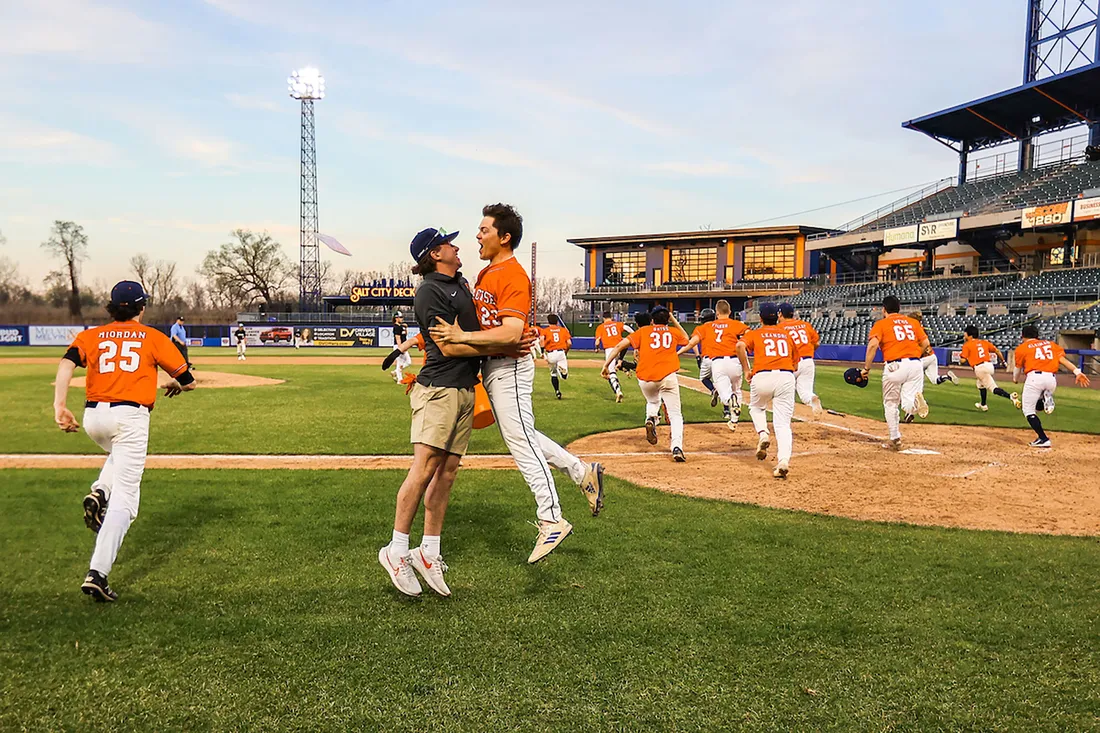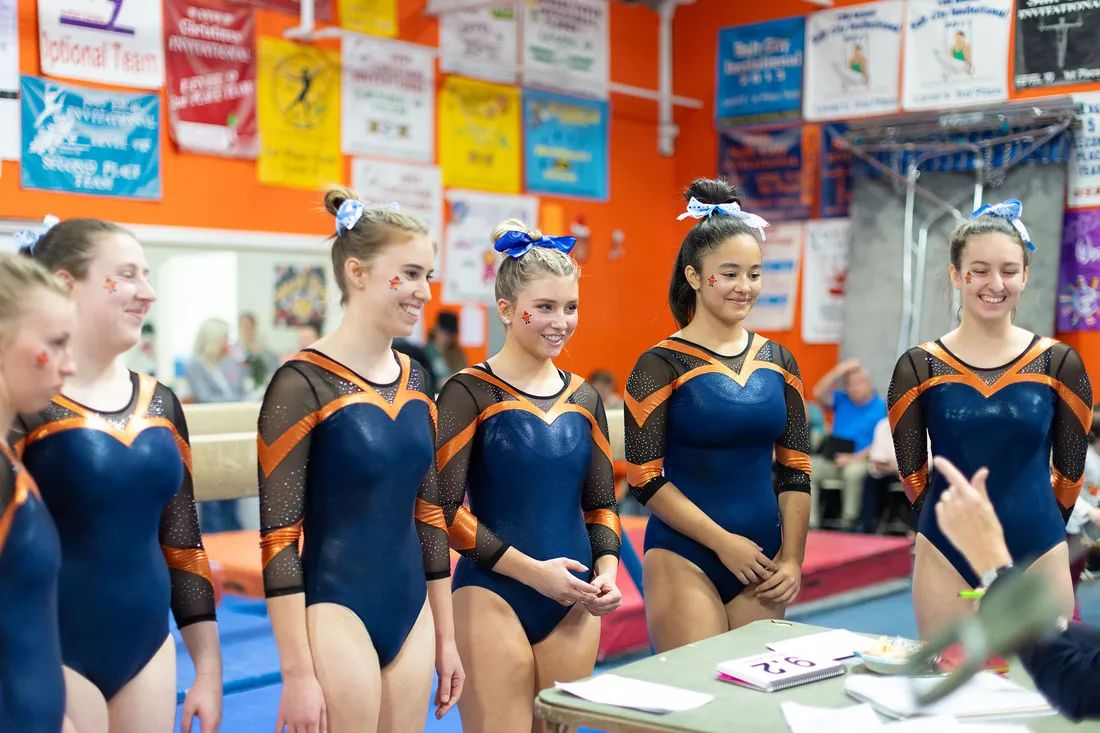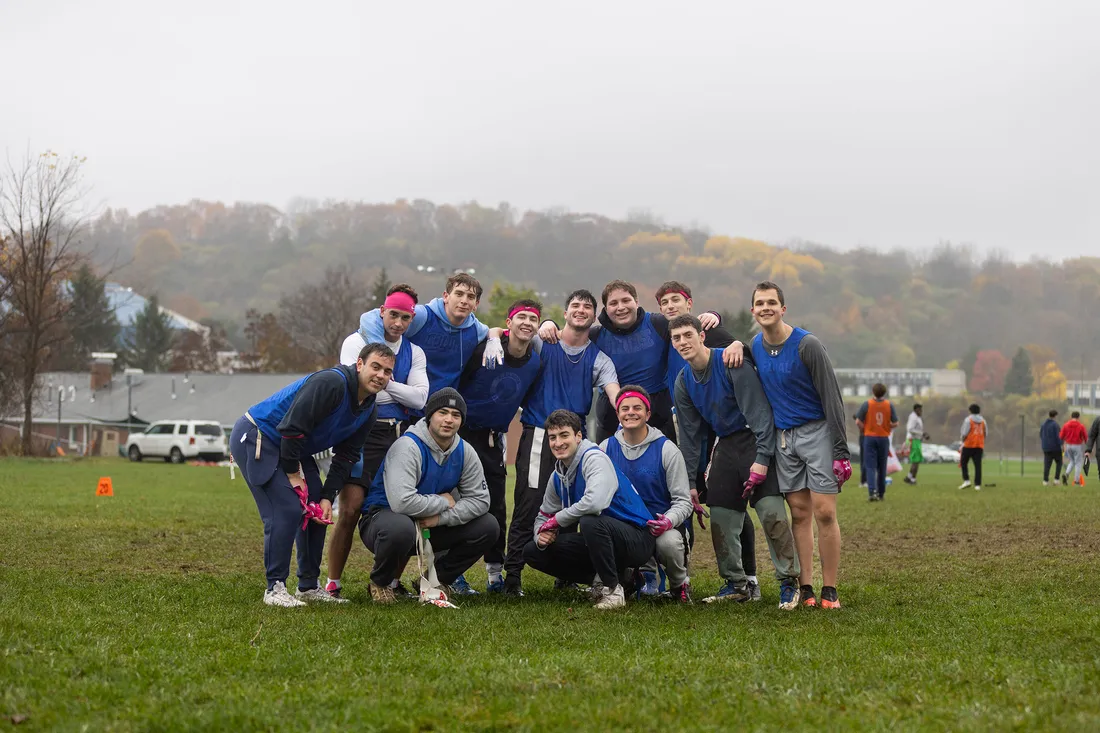
Members of Syracuse Club Baseball celebrate the sport’s 150th anniversary at the University with a doubleheader sweep at NBT Bank Stadium.
When Teague DiNicola ’24 takes the mound this spring, the hard-throwing pitcher for Syracuse Club Baseball will celebrate a campus tradition that’s more than 150 years old.
“Baseball has been at Syracuse almost since Day One,” he says, adding that the University has fielded an intercollegiate team on and off since 1873. “I feel like I’m part of something special.”
Syracuse Club Baseball is one of 45 Competitive Club Sports on campus. Since its inception in 1979, the current iteration of the baseball program has dominated the National Club Baseball Association’s hypercompetitive New England-West Conference. The team also won two division titles during a recent stint in the Colonial Club Baseball Association.
The high competition level is what drew DiNicola to Syracuse Club Baseball in the first place. “Some of the athletes are good enough to play Division I or II sports,” says the Philadelphia native, who was recruited by the University’s club team while in high school.
DiNicola appreciates the comradery that comes with the sport. He also considers the team—and Competitive Club Sports, in general—an extension of the classroom. “It’s preparing me for life.”
Fielding a Holistic Experience

The Syracuse University Sailing Team trains on nearby Cazenovia Lake. “The team goes out of its way to make me feel welcomed,” says Melissa Young ’26 (second from left).
Ever since football and baseball were first played on the present-day site of Shaw Quadrangle in the 1870s, organized sports have been integral to the Syracuse experience.
Today, the University offers an array of sporting opportunities that not only promote school spirit, but also cultivate practical life skills. Chief among them are Competitive Club Sports, which is a standalone unit in the Division of the Student Experience, and Intramural Sports, housed in Barnes Center at The Arch.
“Competitive Club Sports is intercollegiate, meaning that athletes are subject to eligibility requirements. They also travel to other institutions to play,” says Pete Way, director of Competitive Club Sports. “Because their skill level is high, our athletes can help draw attention to their varsity sport counterparts.”
People who play Intramural Sports, on the other hand, are more diverse, ranging from a seasoned competitor to someone lacing up for the first time, explains Jasmine Holmes, associate director of sports programs. “The activities are more welcoming to all, regardless of one’s skill level or previous experience.”
Braeden Cheverie-Leonard ’26, who has coached intramural basketball and officiated intramural volleyball, agrees. “Intramural Sports provides a fun and supportive environment where teammates are your friends and opponents become your friends. This kind of social interaction is just as important as physical activity,” he says.
Building a Better Athlete—and Person
Way describes Competitive Club Sports as “steeped in tradition but built for the future.” Hence, the unit offers a range of individual and dual sports as well as outdoor and indoor team activities. Some programs, like baseball and men’s rugby, are decades old; others, such as esports, which encompasses organized gaming competitions, are relatively new.
“We’ve evolved from a pick-up team to a national contender,” says Brock Alvers ’25 of Syracuse University Men’s Hockey (SUMH), which has notched six regular-season and eight playoff championships since its establishment in 1959.
Although Syracuse has sponsored organized hockey since 1903, SUMH’s recent success reflects the sport’s growing popularity among students. In fact, SUMH’s Hall of Fame Alumni Weekend, now in its sixth year, is one of the program’s biggest draws.
“We couldn’t do it without our volunteer coaches, some of whom drive more than two hours for games and practices, and our team managers who perform many important but unglamorous activities,” says Alvers, a fixture at the Tennity Ice Skating Pavilion on South Campus.

Women’s Club Gymnastics is one of Competitive Club Sports’ fastest growing programs, with 30 new active members.
Other success stories include men’s basketball and synchronized skating, both of which went undefeated last season, and women’s volleyball, a two-time league runner-up. Meanwhile, the University has partnered with Leinster Rugby in Ireland to provide world-class coaching and training expertise to the men’s and women’s rugby programs.
“Competitive Club Sports pushes you to become a better athlete and person,” says Gabriel Fatade ’26, who plays men’s club soccer. “Because we have strict rules about sportsmanship, everybody has fun. The positive environment encourages us to do our best.”
Competitive Club Sports pushes you to become a better athlete and person.
Gabriel Fatade ’26
Bringing Cultures Together

Intramural Sports serves more than 6,000 people of all ages and backgrounds. “There’s a wide range of agility, speed, balance and coordination,” notes Jasmine Holmes, associate director of sports programs.
Intramural Sports is equally impactful. According to Holmes, more than 6,000 people from Syracuse and the SUNY College of Environmental Science and Forestry annually compete in some 30 sports and tournaments on or near main campus. Participants aren’t just students; they’re also staff and faculty members of all ages and backgrounds. “There’s a wide range of agility, speed, balance and coordination,” she says.
Opportunities range from traditional sports like basketball, flag football and hockey to emerging activities like pickleball and wiffleball. Intramural Sports also offers community-building activities such as futsal (a variant of soccer) and kickball.

Intramural Sports like flag football mixes fun and low-stakes competition, explains referee Juhi Idnani ’27.
Because the skill level is so varied, there’s something for everyone almost every night of the week, explains India native Juhi Idnani ’27, who referees soccer, football and volleyball. “Intramural Sports is the perfect mix of fun and low-stakes competition.”
Officiating enables students like Idnani to develop personal and interpersonal skills. Learning how to think on your feet—making instantaneous decisions, resolving conflicts, and dealing with stress and pressure—translates into academic and professional success, she explains.
“It’s one of the toughest jobs on campus,” says Holmes of officiating one’s peers. “The skills needed to practice leadership, adaptability and sound problem-solving are vital to any career path.”
At the same time, Competitive Club Sports and Intramural Sports are all about community, connection and socialization. By enhancing the student experience through organized games and activities, they foster an engaged and inclusive community.
“Sports should be inclusive and accessible, so that everyone can participate,” says Will Shick ’24, president of the Syracuse University Fencing Club. “They promote physical and mental health by exercising the body and mind.”


